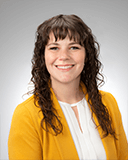Voiceover: This podcast is for informational and educational purposes only. It is not medical care or advice. Clinicians should rely on their own medical judgements when advising their patients. Patients in need of medical care should consult their personal care provider. Welcome to "That's Pediatrics", where we sit down with physicians, scientists, and experts to discuss the latest discoveries and innovations in pediatric healthcare.
Dr. Allison Williams: I'm Alli Williams. I'm one of the pediatric hospitalists here at UPMC Children's Hospital of Pittsburgh.
Dr. Sameer Agnihotri: I'm Sameer Agnihotri. I'm a scientist here at Children's Hospital.
Dr. Williams: And we are so excited to be joined by not only one, two, or three guests, but we have four fabulous guests from the developmental clinic here at Children's Hospital of Pittsburgh. We are joined today by Molly Carter, Justin Kopec, Kenneth Tormey, and Alexis Rodgers who are all psychologists with our developmental clinic. Thanks for being here today. There's so many fabulous folks that instead of us doing the intro like we normally do, I'm actually going to ask them to introduce themselves because we have four different people joining us today, so if you wanted to start.
Dr. Alexis Rodgers: I'm Alexis Rodgers. I'm a licensed psychologist with the Developmental Medicine Team and I'm the newest member of our team. I just joined Children's in August.
Dr. Kenneth Tormey: Okay. I'm Ken Tormey. I'm also a psychologist with the Developmental Medicine Team, and I've been working here for about six and a half years doing primarily autism assessments.
Dr. Williams: Awesome.
Dr. Justin Kopec: My name is Justin Kopec. I'm also a licensed psychologist with Developmental Medicine. I've been here for a little over two years now and primarily do autism evaluations.
Dr. Molly Carter: Hi, I'm Molly Carter. I'm also a licensed psychologist. I'm the fourth on the team and I've been here just about three years as well, primarily doing autism evaluations.
Dr. Agnihotri: It's fantastic introductions. We've heard it a bunch of times. What is developmental medicine?
Dr. Carter: We're part of the Behavioral Science Division of Children's Hospital and we're one of the clinics. We are comprised, this is our whole team here today. We are all licensed psychologists that specialize in determining whether or not child has autism. That is our primary role at Children's.
Dr. Tormey: Why we're called Developmental Medicine, nobody knows because none of us are medical doctors, and it's been something that's been discussed about being changed for pretty much the entire time I've been here, yet we're still Developmental Medicine.
Dr. Williams: I mean, I bet that our community also knows you as the Developmental Medicine specialists now, which hopefully that means that you're getting some referrals from folks, but my biggest question too as a hospitalist is what types of kids are you seeing? What types of symptoms do you see for the kids to make you concerned about autism?
Dr. Carter: Well, I just want to say real quick this, we are also known as the CDU. That might be something that you're more familiar with.
Dr. Williams: Yes, I've heard that one. Okay.
Dr. Carter: The Child Development Unit formally is I believe comprised of medical doctors, so developmental and behavioral pediatricians, child neurologists primarily, and some nurse practitioners. They are more on the medical side, and then we're on the psychological behavioral health side where again, our primary role is evaluating autism, and the CDU side does a little bit more than that than we're able to provide.
Dr. Williams: So, just to further clarify, the CDU and your group are different?
Dr. Carter: Yes, but we work together. We often get referrals from the CDU folks. They often see families first, and if an autism concern is raised, then they refer to us. So, they can see children for general developmental delay, more genetic conditions and syndromes, and then more of a general evaluation. And then, we're very specific to autism.
Dr. Williams: Gotcha. Is your clinic located in the same place as the CDU?
Dr. Kopec: Yes. The CDU's main location is in Oakland and we do see patients in that clinic, but we also do see patients at Children's South in South Fayette. We used to see patients up in Wexford as well at Pine Center, and hopefully will be again soon, but currently not at the moment.
Dr. Agnihotri: Are most of your patients from the Pittsburgh area or do you get referrals from all over?
Dr. Tormey: We get referrals from all over. I mean we'll see kids pretty much from Central PA, all the way out our way, all the way up north to Erie County. We even get kids from West Virginia, Ohio, who come here as well. So, we see a pretty wide range of people geographically.
Dr. Agnihotri: Cool.
Dr. Williams: Do you have to have a referral to go to your clinic or would a parent be able to say, "I'm worried my child has autism for X, Y, and Z reason, and I want to come see you because I've heard about you from this awesome podcast episode"?
Dr. Tormey: Yeah. We actually take referrals from parents, from pediatricians, from the developmental pediatricians, from neurologists. Pretty much anybody who's got a concern for autism refers to us.
Dr. Kopec: I'll just add to that. We do have an intake process, so our intake coordinators really help to figure out, is this an appropriate evaluation for this child based on the concerns that either the parent has. And then, usually from pediatricians or other medical providers, it's kind of more of a direct referral.
Dr. Agnihotri: Yeah. Can you speak a little bit more to that intake process and how you go through these referral cases? It seems like it's very daunting and massive.
Dr. Kopec: Yeah. Our intake coordinators, they kind of follow a process to really figure out, are some of the concerns that parents or whoever are bringing up related to autism or do they seem to be autism related concerns? If there are some, then they will likely get scheduled with us, and if they seem like maybe they might be a better fit for maybe one of our behavioral health master's level specialists to go for an evaluation for just more general behavior concerns, they might kind of schedule an evaluation with one of those clinicians.
Dr. Williams: What types of signs and symptoms are you looking for during these intakes and what ages are most common to see getting this evaluation?
Dr. Rodgers: Autism is a really wide and broad spectrum, but there are certain things that are pretty consistent across cases. So, we're looking for differences in social communication, the way that a child interacts with responds to initiations from other people, verbal and nonverbal communication. That kind of social emotional give and take is one of the big ones that we're looking for. And then, we also look for patterns of restricted or repetitive behaviors. So, having a narrow line of interest or doing certain behaviors over and over again, those are the signs that we are looking for.
Dr. Agnihotri: Speaking about that, does the criteria change over time? I could only imagine with conferences or new guidelines, so you must be in constant flex of new terms and what to look for.
Dr. Carter: The core diagnostic aspects of autism haven't changed much over time. It's still social communication impairments, social interaction impairments, and then the restricted, repetitive patterns of behavior. The one thing that comes to mind is that recently in our most recent diagnostic manual, they've added levels of autism. So, now, we are required to provide a level with a diagnosis if we provide it, and we can talk more about that, but the levels differ based on how much support someone needs in those three areas that autism does impact.
Dr. Williams: That must help get the community resources that you'll need after you have this diagnosis to potentially having this strata of almost severity. Is that the right term maybe for it?
Dr. Agnihotri: Yeah.
Dr. Williams: Okay.
Dr. Carter: Yeah. I think it helps understand a child or a young adult, adolescent, and in adults areas that they're doing well and areas that they need support or are more challenging as it presents in their autism.
Dr. Williams: So, if I'm a mom and I have a young toddler that I'm worried maybe isn't making great eye contact with me, hasn't really started using as many words as I think they should and my pediatrician's worried too, and we say, "Hey, I think you could really benefit from seeing these four fine folks in the developmental clinic," what would that then look like for me as a parent? What's that process?
Dr. Tormey: The process would be first getting referred and going through that intake process. So, somebody would call and kind of go through that process, and the intake coordinator would determine, is it an appropriate referral for us directly? Sometimes they might go to see one of the developmental pediatricians through the Child Development Unit first because oftentimes, our wait list is longer.
Sometimes they can get in with a developmental pediatrician within a couple of months to kind of give them a kind of abbreviated look at the child and see, are there services we can get in place right away and do we need to do a more formal assessment, and if so, then they'll refer to us. That's usually what the process looks like. And then, if they do get referred directly to us, the process is pretty consistent I think across all of us.
The first part of the appointment is just us getting background information from the parent or caretaker, whoever brings the child for the appointment. During that time, the child just kind of plays. We have toys in our office. We get to observe them and see how they interact, how they play. Then we take a little break after we get the background information. That usually takes anywhere from 45 minutes to an hour. We take a break. We put our toys away. We set up the room with a whole different set of toys and activities to do an assessment with the child. It's called the Autism Diagnostic Observation Schedule or ADOS for short.
During that process, it depends on the child's language abilities, whether or not the parent's going to be in the room or not. The kids with pretty fluent communication skills, we're going to do that one-on-one. The parent's going to stay in the waiting room during that process. Kids with any significant impairment in communication, the parent's going to be in the room with us throughout the observation, typically just sitting back, hopefully just quietly observing. But they're told in advance that if the child interacts with them or tries to engage them during the assessment, just to react like they normally would.
Dr. Williams: Okay. I can imagine that would be really hard as a mom or a caregiver. If your kid comes up to you, it's like, "Oh, don't."
Dr. Tormey: Yeah, exactly. We don't want them to ignore them and not respond, but we also don't want them to be prompting the child what to do or what to say or how to interact. We really want to see what they'll do independently with us and with the activities that we present. And then, we present them kind of a variety of social and play activities. After the assessment, we take one more break for us to score everything, and then we get back together again, and we go over the results and the recommendations at that time. So, everything happens on that day, and the whole process can take anywhere from usually two to three hours.
Dr. Williams: Wow. I would say, that sounds lengthy and very in-depth, also very fun to play with all these different new toys. You mentioned a wait list. There's a wait list for your clinic. What's that running these days?
Dr. Kopec: Yeah. There usually is a wait list. Unfortunately, it's a high area of need. A lot of people are looking for these kinds of evaluations. I think the wait list is constantly changing. Right now, I think we're scheduling into maybe April or May, so about five or six months out. We're always trying to do things to mitigate and decrease that weight. Like Alexis said, she recently joined our team and that's helped to really get more kids in quicker, but we do the best we can to see families as quickly as possible.
Dr. Tormey: We also do have a cancellation list that parents can get on. Our schedulers are very good about keeping in touch with families to periodically check. "Do you still want that appointment? Are you still planning on coming to your appointment in three weeks or four weeks?" And if not, they'll open up that slot and go to the cancellation list. So, there's some paperwork that gets sent out to the family to complete, when they do the phone intake, and for families that complete that paperwork and send it in right away, they get put on the cancellation list and that's the list that they'll go by to try to start filling in those slots, if somebody calls the cancel or when they're confirming appointments in advance, if somebody doesn't want that appointment. They're remarkably good at filling those slots. I had one just last week where my Tuesday morning slot was empty late in the afternoon on Monday, and I thought, "Wow, that's unusual," and about 10 minutes later, somebody was in it. So, they are really, really good at maximizing our time, I think.
Dr. Agnihotri: So, speaking of time in these waiting lists, is it that autism is on the rise or is it a funding issue or is it a resource issue of any sort?
Dr. Rodgers: I think it can be a combination of all of the above. Autism diagnoses have definitely been rising, but I think a big part of it is that awareness of the signs and symptoms is increasing, so we're seeing a lot more referrals than maybe a couple years ago because people are more aware of what to look for with autism.
Dr. Carter: If any parents are listening, I would encourage you to speak with your pediatrician as well. They're well aware of autism, and I think it would help get to our clinic faster if we have that pediatrician support and they put in that referral. We tend to right now focus on the pediatrician referrals and getting that internal referral working with your pediatrician. I'd like to just share that.
Dr. Williams: No. I think that's a perfect tip and trick, and that was kind of where I was going to go next is well, everyone is busy. Your appointments are long. They're very intensive and they lead to a lot of great information. But while parents are waiting for that and pediatricians are waiting for this kind of formal assessment of autism, is there anything that parents could or should be doing or pediatricians can be doing to help these kids meet their full potential?
Dr. Tormey: The biggest thing for this group in general is the earlier we get the interventions going, the better these kids tend to do. So, we don't want them to be waiting to see us to pursue other things. Every county has an early intervention services, which is for kids birth to three years old. And then, for kids from three until kindergarten age, there's something called the intermediate unit that takes over those same kinds of services. So, depending on the child's age, usually when they call our intake line, usually they would provide them the information. They usually ask about current services, and if they're not getting any services, they would give them the information to pursue either the early intervention evaluation or the evaluation through the intermediate unit to get services through them. That can include things like speech therapy, occupational therapy, physical therapy. For the IU, specialized preschool programs. So, it all depends on the child's evaluation through that program in order to determine what they're eligible for, but we definitely want them to be getting services and supports as soon as possible and not waiting five or six months to come see us.
Dr. Agnihotri: Yeah. This is such an important topic. Are there local or national conferences that you guys can share your advice with other groups or get input to improve your system and vice versa? I think collaboration here would really be key.
Dr. Rodgers: Nationally, there is the International Society for Autism Research, so internationally. Because I'm new to our team, I'm not sure if anybody within our team has been to that conference before, but I've gone several times in the past and it's a great opportunity because it's not only behavioral health specialists. It's all providers who specialize in autism. So, there's a lot of learning there and it's really fun and exciting. I'm not sure about more local opportunities.
Dr. Williams: I know that the AAP sometimes has a lot of information for general pediatricians too about autism. There's articles that come out every now and then. I don't know if there's any other specific research or literature that you all look at. You mentioned the diagnosis criteria, the DSM. Is there's any other resources that our pediatricians could be using to maybe learn more about this, especially while they're waiting for your wait list? I don't know if there's any of those.
Dr. Tormey: I think most pediatricians offices have all the information about the early intervention services and the IU services to direct the families to the correct place for them to start. Other things, I mean, there is certainly like Autism Speaks has online resources for parents to pursue things that they have both local and more national information on there. I always want to call them a board. They're been known as Autism Connection for years now, but were a board for many, many years before that. So, Autism Connection is another online resource that's more of a local Allegheny County online resource for parents and providers who work with kids with autism.
Dr. Williams: That's awesome. I imagine that a lot of the treatment and interventions... I don't want to use the term treatment. But interventions for children that end up with a diagnosis at whatever level of autism, it's really the interventions that they get, the support that they get, and most of those are through that early intervention or through that school program. I don't know if there's any other treatment that you guys wanted to share about. I keep using the term treatment. I feel like that's the wrong term. But intervention, you could share with our community for how to address autism in children.
Dr. Tormey: The main recommendation we make for kids when we give them the diagnosis are typically for more intensive therapy services in addition to what they're already getting through either early intervention or the intermediate unit. There are intensive in-home services known as IBHS or it stands for Intensive Behavioral Health Services, for 25 plus years. They were known as wraparound services here in Pennsylvania.
Dr. Williams: That term sounds familiar.
Dr. Tormey: Yeah. A couple of years ago, they changed it to this IBHS system. But those services are more intensive than the early intervention and IU services. They're provided in home. The therapists come usually multiple times a week to work with the child and to address the variety of deficit areas that we're working on to try to catch them up to where they should be developmentally.
Dr. Williams: These follow-ups after the diagnosis has been given to the family after your evaluation, that's through other folks. Do you all follow up with the patients or is it more of a diagnosis clinic, and then giving them the resources?
Dr. Rodgers: Typically, because of the high need for the evaluation piece, typically, we will refer them to those services and there's no follow-up. I am starting to pilot a little bit of a parenting intervention, so being able to meet with families who might really voice a need for some follow-up, provide them more information about the diagnosis and their child's specific symptoms and treatment recommendations, and how to help with various skills that they might need to continue developing. That's something that we're starting and it's not really off the ground yet, but it's something that we're looking forward to.
Dr. Williams: Any social media that we should let our families and providers know about to get more information about your clinic? Is there a website they can go to? A phone number they should have? Any sort of Instagram they could follow or things like that?
Dr. Agnihotri: Yeah.
Dr. Carter: I know we're on the Children's Hospital Pittsburgh website under probably Developmental Medicine tab. You can see all of our profiles and our biographies. There should also be contact information of how to call if you do have a concern and would like an evaluation.
Dr. Williams: We are so appreciative of you all spending your time here and letting us know more about your clinic and sharing this information with all of our listeners. If you all have any questions or concerns, please go to the chp.edu and look for their clinic under the Developmental Clinic tab. We appreciate you listening to this episode of That's Pediatrics.
Dr. Agnihotri: Yeah, thank you.
Voiceover: You can find other episodes of That's Pediatrics on Apple Podcasts, Google Podcasts, Spotify and YouTube. For more information about this podcast or our guests, please visit chp.edu/thatspediatrics. If you've enjoyed this episode, please be sure to rate, review, and subscribe, to keep up with our new content. You can also email us at podcast.upmc@gmail.com with any feedback or ideas for topics you'd like our experts to cover on future episodes. Thank you again for listening to That's Pediatrics. Tune in next time.









 Molly H. Carter, PsyD, specializes in diagnostic evaluation of childhood developmental and behavior disorders, particularly neurodevelopmental disorders including autism spectrum disorder. She evaluates children between the ages of 18 months and 8 years old. Dr. Carter also conducts Parent-Child Interaction Therapy (PCIT) with families of young children to address a range of behavioral concerns. Dr. Carter was born and raised in Pittsburgh, and currently lives in the North Hills. She enjoys hiking, traveling, and spending time with her family.
Molly H. Carter, PsyD, specializes in diagnostic evaluation of childhood developmental and behavior disorders, particularly neurodevelopmental disorders including autism spectrum disorder. She evaluates children between the ages of 18 months and 8 years old. Dr. Carter also conducts Parent-Child Interaction Therapy (PCIT) with families of young children to address a range of behavioral concerns. Dr. Carter was born and raised in Pittsburgh, and currently lives in the North Hills. She enjoys hiking, traveling, and spending time with her family.  Justin Kopec, PhD, NCSP, is a licensed psychologist certified by the Pennsylvania Board of Psychology and the National Association of School Psychologists. He earned a bachelor's degree in psychology at the University of Massachusetts Lowell, and his master's degree in psychology and doctorate in school psychology from Syracuse University. Dr. Kopec has extensive experience in diagnostic evaluation of childhood behavior disorders, particularly neurodevelopmental disorders including autism spectrum disorder. He works with children between the ages of 18 months and 8 years old. Dr. Kopec also conducts parent-child interaction therapy (PCIT) with families to address behavioral concerns. Dr. Kopec is a member of the American Psychological Association and the National Association of School Psychologists. He lives in the North Side of Pittsburgh and enjoys live music and exploring different cuisines that the city has to offer.
Justin Kopec, PhD, NCSP, is a licensed psychologist certified by the Pennsylvania Board of Psychology and the National Association of School Psychologists. He earned a bachelor's degree in psychology at the University of Massachusetts Lowell, and his master's degree in psychology and doctorate in school psychology from Syracuse University. Dr. Kopec has extensive experience in diagnostic evaluation of childhood behavior disorders, particularly neurodevelopmental disorders including autism spectrum disorder. He works with children between the ages of 18 months and 8 years old. Dr. Kopec also conducts parent-child interaction therapy (PCIT) with families to address behavioral concerns. Dr. Kopec is a member of the American Psychological Association and the National Association of School Psychologists. He lives in the North Side of Pittsburgh and enjoys live music and exploring different cuisines that the city has to offer. Alexis D. Rodgers, PhD, is a licensed psychologist at UPMC Children's Hospital of Pittsburgh. She earned her bachelor's degree in psychology from Saint Vincent College and her master's degree in school psychology, graduate certificate in developmental disabilities, and doctorate in school psychology from the University of Kentucky. Dr. Rodgers has extensive experience in evaluation and differential diagnosis of neurodevelopmental, behavioral, and mood disorders in children and adolescents, as well as treatment of a wide range of pediatric behavioral health concerns, including developmental delays, challenging behaviors, and social-emotional difficulties. At Children’s, Dr. Rodgers is embedded into the Division of Pediatric Plastic Surgery, primarily addressing the behavioral health needs of Cleft-Craniofacial Center patients, and she also serves patients referred to the Developmental Medicine Program through diagnostic evaluations for Autism Spectrum Disorder (ASD) and support/consultation for parents of newly-diagnosed children with ASD.
Alexis D. Rodgers, PhD, is a licensed psychologist at UPMC Children's Hospital of Pittsburgh. She earned her bachelor's degree in psychology from Saint Vincent College and her master's degree in school psychology, graduate certificate in developmental disabilities, and doctorate in school psychology from the University of Kentucky. Dr. Rodgers has extensive experience in evaluation and differential diagnosis of neurodevelopmental, behavioral, and mood disorders in children and adolescents, as well as treatment of a wide range of pediatric behavioral health concerns, including developmental delays, challenging behaviors, and social-emotional difficulties. At Children’s, Dr. Rodgers is embedded into the Division of Pediatric Plastic Surgery, primarily addressing the behavioral health needs of Cleft-Craniofacial Center patients, and she also serves patients referred to the Developmental Medicine Program through diagnostic evaluations for Autism Spectrum Disorder (ASD) and support/consultation for parents of newly-diagnosed children with ASD. Kenneth Tormey, PsyD, specializes in pediatric psychology. He practices at CHP S Fayette - PhD/PsyD and is affiliated with UPMC Children's Hospital of Pittsburgh. He completed his Doctor of Psychology at Nova Southeastern University and Master of Science at Nova Southeastern University.
Kenneth Tormey, PsyD, specializes in pediatric psychology. He practices at CHP S Fayette - PhD/PsyD and is affiliated with UPMC Children's Hospital of Pittsburgh. He completed his Doctor of Psychology at Nova Southeastern University and Master of Science at Nova Southeastern University.
